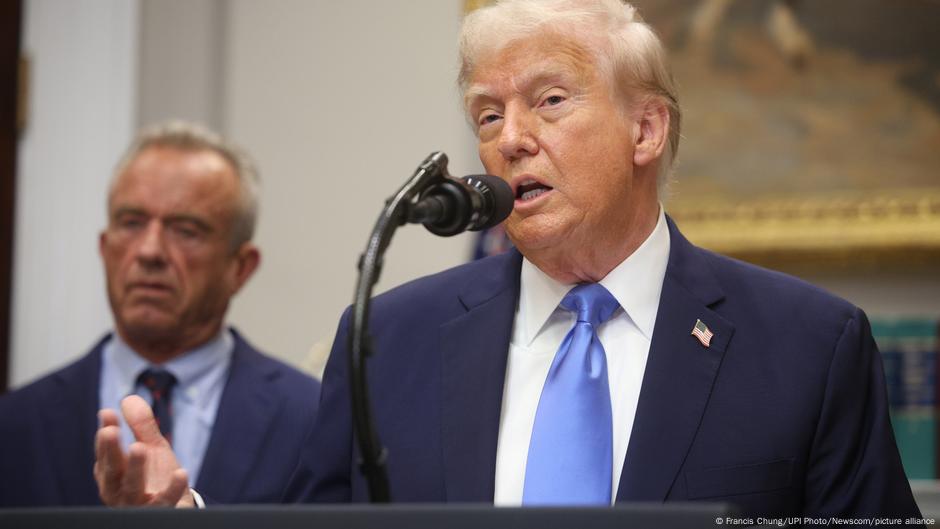
Recent changes to vaccine and medicine recommendations in the United States have sparked concern among global health experts, who fear these shifts could undermine health messaging worldwide. In September, the US Advisory Committee on Immunization Practices (ACIP) updated its guidelines for the combined measles-mumps-rubella-varicella (MMRV) vaccine in children and COVID-19 vaccines for all US residents.
Additionally, the committee deferred a decision on altering recommendations for the hepatitis B vaccine in newborns. Meanwhile, US President Donald Trump announced that the hepatitis B vaccine should not be administered to children before they reach 12 years of age, diverging from current medical advice that recommends immunization over the first 18 months of life.
New Vaccine and Drug Recommendations in the US
The ACIP’s updated recommendations now suggest delivering the MMR vaccine separately from the varicella vaccine, which protects against chickenpox. Previously, the combined MMRV vaccine was recommended for children under four. Data presented at the meeting indicated that 85% of US children already receive these shots separately. However, splitting the vaccines means children are not fully protected against all four diseases until they receive each vaccine individually.
Declines in vaccine uptake have led to a resurgence of measles cases in the US, reaching two-decade highs, with similar trends observed globally. The Trump administration panel did not endorse COVID-19 vaccines for the general public but rejected restrictions that would have required a prescription to obtain a COVID-19 jab.
In another controversial move, Trump linked the common painkiller Tylenol to autism, prompting the Food and Drug Administration (FDA) to recommend that the drug, which is the only readily available painkiller approved for use during pregnancy, should be used only after consulting a medical professional.
A Nuanced Perspective
President Trump justified the hepatitis B vaccine delay by stating that the disease is primarily sexually transmitted. While this is true, hepatitis B can also spread through contaminated needles and the fecal-oral route, similar to polio transmission. In communities with declining vaccination rates, cases of such diseases have increased.
The conflict between political messages and established health advice has been criticized by experts. Even senior health officials within the Trump administration, such as Jay Bhattacharya, Marty Makary, and Mehmet Oz, have acknowledged the lack of a definitive link between painkillers and autism in an op-ed for Politico.
“Despite the sharp rise in autism prevalence, there is no scientific consensus on what is causing rates to grow, and families have few effective tools to prevent or treat it,” they wrote. “Acetaminophen should be used judiciously in pregnancy, and under medical supervision of an obstetrician, as a practical, prudent medical approach that balances risks and benefits.”
Jörg Dötsch, director of the Clinic and Polyclinic for Pediatrics and Adolescent Medicine at Uniklinik Köln in Germany, emphasized the importance of adhering to international scientific consensus amidst conflicting government advice.
“To my mind, it’s … important to always refer to what the international scientific community has achieved with all its research attempts and perspectives,” Dötsch said.
US Changes Could Damage Global Trust
Despite acknowledgments of contradictory science from some US health officials, these statements lack the impact of televised announcements by the US president. As a leading global economy and a center for medical innovation, US policies significantly influence international perceptions.
“What happens in Washington echoes in Lagos, Nairobi, Cape Town, and other places,” Charles Shey Wiysonge, a senior director at the South African Medical Research Council, told DW.
Julie Leask, a social scientist specializing in immunization at the University of Sydney, expressed similar concerns about the potential global repercussions of US vaccine debates.
“People are trying to make sense of all this noise coming out of the US. They want to do what’s best for their health and their children’s health. It’s sad that we’re now having to warn people to be so discerning about what they will hear from the current US government on vaccines,” Leask said.
She highlighted that most countries have multipartisan support for vaccination, guided by experts who carefully evaluate evidence and prioritize vaccine safety.
Dötsch advises individuals to consult trusted medical professionals for health-related questions, especially amid ongoing conflicts between scientific recommendations and non-medical opposition.
“At the end of the day, everybody has to find somebody who [they] trust,” Dötsch said. “That might, for instance, be the family doctor, the GP or the pediatrician that is treating a child, or a gynecologist that is supervising the pregnancy.”
As global health experts continue to navigate these challenges, the importance of relying on evidence-based medical advice remains paramount.






